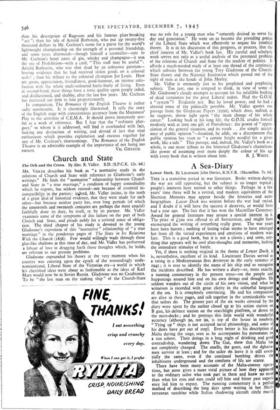A Sea-Diary
Lower Deck. By Lieutenant John Davies, R.N.V.R. (Macmillan. 7s. 6d.)
THIS is a transition period in war literature. Books written during the war are still appearing, but the subject is no longer topical ; people's interests have turned to other things. Perhaps in a few years' time there will be a revival, and modern equivalents of the Sherston Memoirs may appear beside the histories and auto- biographies. Lower Deck was written before the war had ended. and I doubt if it will have the success it deserves, or would have had a year ago. The fact that it has won the Macmillan Centenary Award for general literature may arouse a special interest in it. The prize of L5o0 was offered to all Servicemen, and might have encouraged the writing of something really great. The war years have been barren ; nothing of lasting value seems to have emerged hot from all the varied experiences and emotions of modern war- fare. This is a good book, but it is not a classic ; and soon, any- thing that appears will be cool after-thoughts and memories, lacking the immediate stimulus of battle.
Yet, if there is nothing original in the theme of Lower Deck, it is, nevertheless, excellent of its kind. Lieutenant Davies served as a rating in a Mediterranean fleet destroyer in the early summer of x942 ; it is easy to identify the name of his ship and to recognise the incidents described. He has written a diary—or, more exactly, a running commentary in the present tense—on the people and happenings around him and on his own doings and thoughts. He seldom wanders out of the circle of his own vision, and what he witnesses is recorded with great clarity in the colourful language of the sea. It is completely convincing. He and his companions are alive in these pages, and talk together in the unmistakable way that sailors do. The greater part of the six weeks covered by the diary were spent by the author closed up at his action station on B gun, his defence station on the searchlight platform, or down on the mess-decks ; and he portrays this little world with wonderful accuracy (although 9o, not 99, is top of the house in tombola, "Tying up" ships is not accepted naval phraseology, and some of his dates have got out of step). Even better is his description of Malta during the siege, seen as he accompanies his messmates on a run ashore. Their doings in a long night of drinking and good comradeship, wandering down The Gut, show that Malta has not completely changed. The smells, the goats, and the dghaiss- men survive at least ; and for the sailor 6n leave it is still essen- tially the same, even if the continual bombing drives the inhabitants underground and the comforts of life are scarce.
There have been many accounts of the Malta-convoy opera- tions, but pone gives a more vivid picture of how they appeared to the ordinary sailor who took part in them and knew no more than what his eyes and ears could tell him and bitter past experi- ence led him to expect. The running commentary is a perfect method of describing the long days spent waiting in hot Medi- terranean sunshine while Italian shadowing aircraft circle round, the alarms when high-level and torpedo bombers are sighted, the suspense while they fly in but are still out of range, and the sudden relief when the guns open up and fear is forgotten amid the noise and flash and mad activity of keeping the guns supplied: In the last chapter, when the ship is sunk and takes down with her so much of the love and affection that sailors will always feel, there is a most moving, subjective account of abandoning ship, of the struggle to keep afloat, the growing exhaustion, and the blank fog that descends on the mind in such catastrophes. It is a faithful record. Unpretentious simplicity and truth are its merits ; it awakens sympathy and belief, and honours a band of ordinary sailors, many of whom did not survive.
G. P. GRIGGS.































 Previous page
Previous page